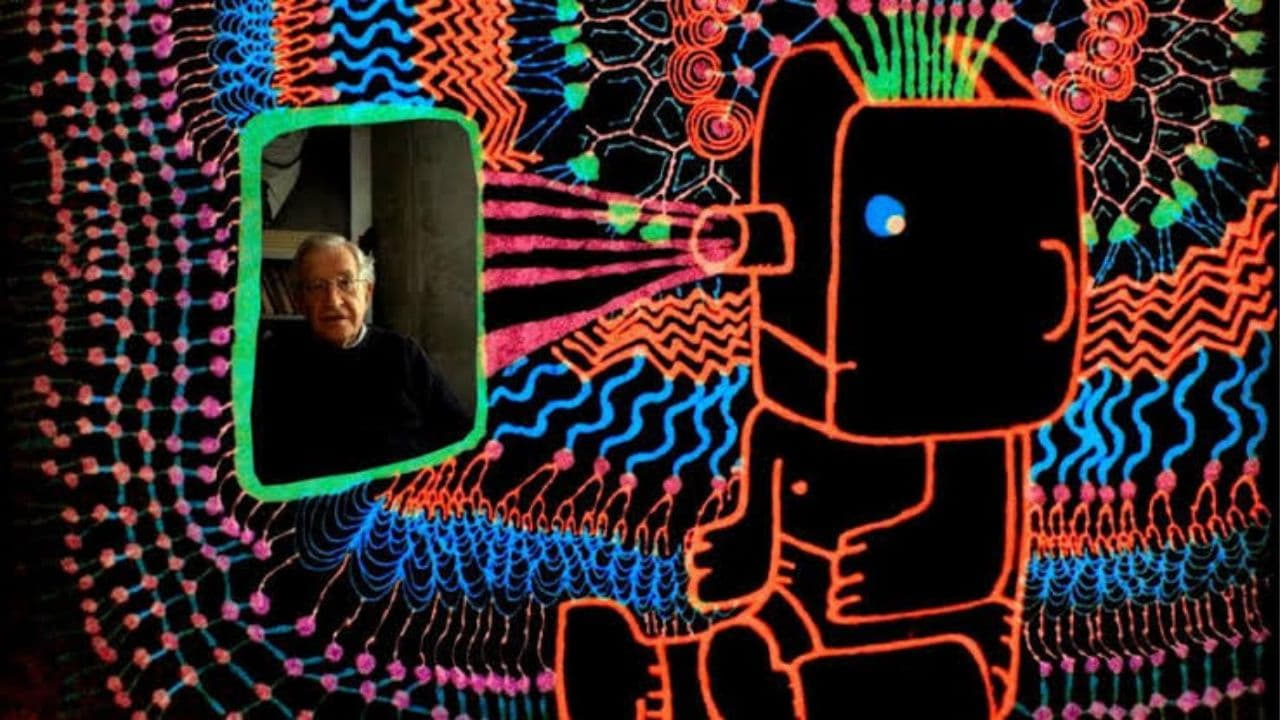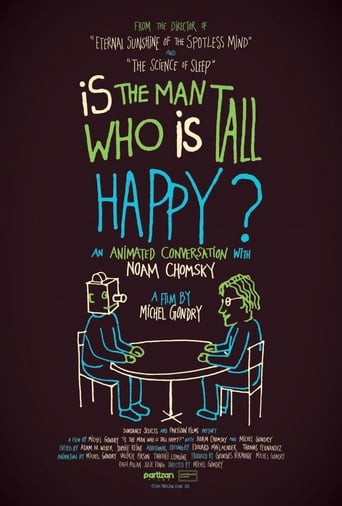

Better Late Then Never
... View MoreFun premise, good actors, bad writing. This film seemed to have potential at the beginning but it quickly devolves into a trite action film. Ultimately it's very boring.
... View MoreI enjoyed watching this film and would recommend other to give it a try , (as I am) but this movie, although enjoyable to watch due to the better than average acting fails to add anything new to its storyline that is all too familiar to these types of movies.
... View MoreThe movie really just wants to entertain people.
... View MoreGondry, a visionary whimsical director and director of some of my favorite movies ever, and Chomsky, one of the most important thinkers and linguists of the last century, and one of the 'idols' of my youth, sit face to face and talk about stuff. What could go wrong? A lot!Gondry is an artist, not a linguist or a scientist, so I wasn't expecting him to be at Chomsky's level on what Chomsky knows best: linguistics and cognitive science. However, he does a good job at extracting some juice about many personal matters as well as a general discussion on Chomsky's themes. The conversation is not a chit-chat for sure, the subjects discussed are complex and need of your full attention, unless you are a linguist and familiar with those. The naive animation is whimsical and humorous, hilarious at times, sentimental at others, surreal at others, but very engaging; without the animation, I might have been watching my watch as much as the movie. Besides, the animation was really on point quite often, and Gondry is able to get onto animation difficult concepts, quite abstract at times, and make them look simple for us. When Chomsky relaxes, he seems to be a nice man, and it was lovely getting to know a bit about his family background and personal life, the human behind the brain. Finally, I also loved the introduction made by Gondry on how a documentary or a film about a person is the film-maker's filtered version of a given subject or person as the film-maker decides what goes on and what doesn't in a film, how a person is portrayed etc. A few things irritated me or disappointed me in the film. The first is Chomsky's attitude at times, arrogant and elitist, who doesn't listen to Gondry. I found ironic that he, the quintessential linguist, had difficulty understanding that Gondry's mother tongue not being English, there were some semantic confusion of misinterpretation on his part, and that Gondry wanted to explain himself properly; however, every time he did so, Chomsky cut him sharply.Also, I expect Chomsky not to act as God, as this is not an academic symposium but a documentary for the general public. Several times in the film, he says "and that is wrong" and doesn't explain why is wrong, and moves on expecting us, the viewers, to get what he means by magic!The second thing that annoyed me was the fact that Politics were left off the movie, except for a brief comment on Sarkozy. This was never going to be a film for the Masses, or the sort of film that attracts ultraconservative viewers, so why skipping Politics altogether?Finally, Gondry himself irritated me a bit. I love his work, his vision, the fact that he doesn't take himself too seriously, and his endless curiosity and creativity. However, at times, I felt the film was as much about himself as was about Chomsky, and there was not need for that. Chomsky is not the Kardashians, he doesn't do this sort of stuff that often, why wasting time on Gondry's personal musings? I also found surprising that Gondry didn't discuss or establish which sort of questions were off the charts beforehand, because it's a bit painful hearing him asking Chomsky how he felt about his wife's death (can't you imagine that?) or what makes him happy.Overall, a fascinating film that requires of your full attention, but it is rewarding, never boring, and offers an insight, albeit limited, into Chomsky the real man and some fascinating subjects as the way we humans apprehend reality.
... View More"What makes you happy?" "I don't really think about it much." What do you get when two you combine the innovative brainwaves of French director Michael Gondry (Eternal Sunshine of the Spotless Mind, The Science of Sleep) with that of esteemed American linguist, philosopher, cognitive scientist, logician, political commentator and activist Noam Chomsky? You get an animated documentary film in which challenges the mind and provokes thoughts to arise within the deepest spectrums of our psyches we never knew were there, with a unique choice of aesthetic. So, is the man who is tall "happy"? Let's take a look.Released in February 2013 and directed, written and animated by Gondry, he uses his own drawings to allow complex ideas into more accessible and tangible ones to expand the forum of the documentary to its fullest extent. Painstakingly taking two years of his life to doodle each and every sketch to match the soundtrack of the learned wisdom of Chomsky, Gondry indeed pulled off yet another feat with his original, audacious and colorful animation. So, is the man who is tall happy? It was twice in 2010 that Gondry met with Chomsky for a series of conversations about his deep knowledge in philosophy, linguistics and also for a glimpse through the window into the author's childhood in Philadelphia. Gondry was inspired by picking up the work of Chomsky in a New York bookshop. Deciding to first record talks with the professor at MIT, where Chomsky teaches, Gondry then used those discussions as a springboard for animated explorations of their content. Chomsky says at one point in the film, "If you're willing to be puzzled, you're able to learn," a concept he stands by as he grows. Even an intelligent man like Chomsky can be confused, it seems, and through this, we as the audience learn quite a lot indeed. Even though no one specifically asked or confronted Gondry to create a 16mm animated documentary about one of the most prominent thinkers in society, he explains that he was looking for a project to occupy his free time while editing 'The Green Hornet' and producing 'Mood Indigo'.As we the audience are seeing the ideas and theories of Chomsky come to life on the screen through the animation of Gondry, what we are actually viewing is the interpretation of those ideas and theories as Gondry depicts them. The drawings show themselves to be vivid and playful, but also a tad crude. But one cannot blame a director he intrepidly keeps us intrigued with his dancing and lively animation at 24 frames per second.Not all of the movie is theory and concept. We actually meet Chomsky halfway into the picture. H speaks of growing up with an academic "Zionist" father in Philadelphia, his experience in a grade school, the terror of race riots during WWII—filling the rounded portrait of an intensely guarded but affable man. Near the end of the film, in the sole musical portion (scored to Mia Doi Todd's "I Gave You My Home"), Gondry pays a poignant homage to Chomsky's wife of 59 years, Carol, who passed away in 2008. It appears that the man, Chomsky, is tall but not so happy, due to the death of his wife. At the end of the movie, it seems that, perhaps for the first time, the two men with very different minds might finally be on the same page.At 89 minutes, one might argue that that is too much time to be listening to a great thinker discuss theorems and ideologies of scientific concepts. In its nicest and truest form, the film plays out as a cool after school meeting with that certain professor you've always admired. Chomsky and Gondry, although mismatched on paper, share an odd but genuine chemistry when it switches back to real life.Bill Stamets from the Chicago Sun-Times puts it well: "The film's title dates from the '50s, when it served linguists as a specimen of a polar interrogative to demonstrate a structure-dependent syntactic rule. Or, in ordinary language: how a child knows which 'is' to move when changing a sentence like 'The man who is tall is happy' into a question. Chomsky explains generative grammar with ease, even as he calls language "an infinite array of structured expressions which have a meaning and a sound." The animation was truly a labor of love, dedicated solely to his "professor" that Gondry, the "pupil," looked upon with admiration and respect. Stylistically capturing beautifully abstract and yet sophisticated drawings to clarify Chomsky's occasional drivel, 'Is The Man Who Is Tall Happy?' is indeed a creative and colorful sojourn into the kaleidoscopic minds of a modern linguist and a director's whimsical and whirring animation. Again, is the man who is tall happy? Yes...yes I believe he is.
... View MoreI would have LOVED to hear a good film with some narration concerning Naom. Instead I got a constant annoying projector and misc sounds interrupting what was otherwise a potentially great film. The graphics were amateurish and often pointless. I felt it discounted from his responses more than enhancing them. I didn't see the point in the perpetual noise or randomly agitating the viewer with unnecessary sound. I'm not so schizophrenic I need perpetual noise in order to appreciate an otherwise potentially dry point. Not that I even think of Naom as dry! He's interesting and all that crud did was detract from his speaking or the ability to focus on it. You'd think you'd want to enhance what he is saying but this film does everything but. It just wasn't enjoyable . . . . . . . . . .
... View MoreA series of interviews featuring linguist, philosopher and activist Noam Chomsky done in hand-drawn animation.Because of Gondry's accent, and at times because of Chomsky's age, the discussion is a bit difficult to understand, and you have to focus. Interestingly, there is a communication breakdown between Gondry and Chomsky, as well, because of translation and pronunciation issues.The film is part biographical, part about language acquisition. There is no discussion of politics, which is probably good, because it makes this a much more timeless presentation.There is mention of "irreducible complexity", which seemed odd, and then Gondry mentions astrology? He seems to be a bit out of his league at times. At least he was able to get Chomsky to talk about his wife Carol, which has been a sensitive topic.
... View More